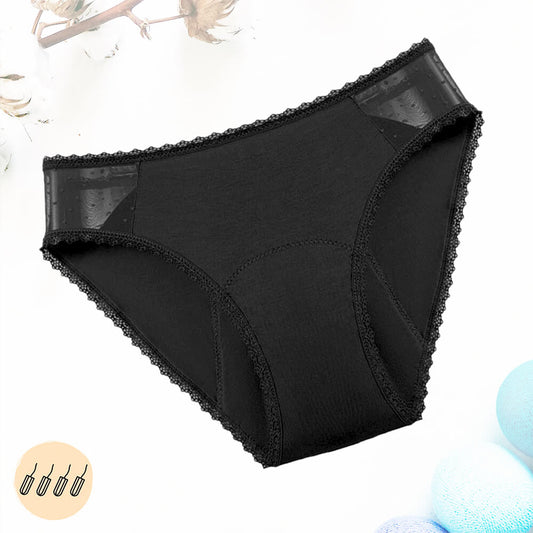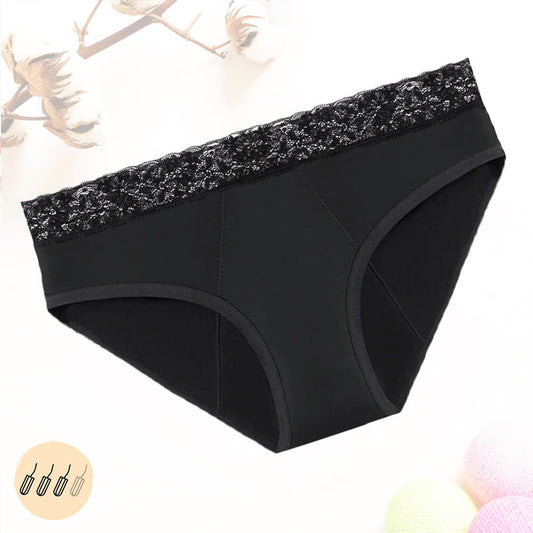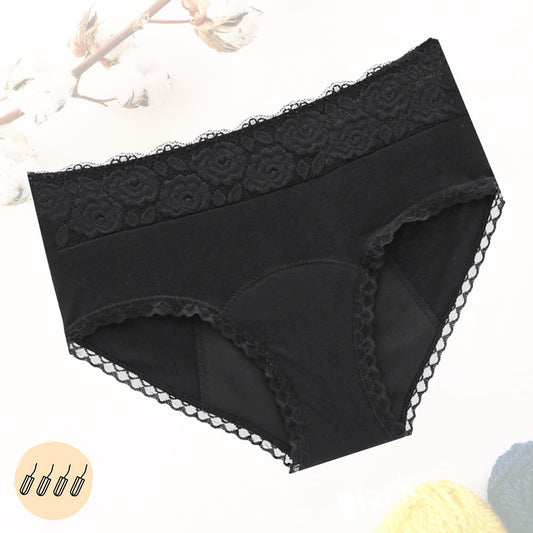
More comfortable and more environmentally friendly than disposable sanitary napkins, the Period Panties is a great option for dispensing with pads and tampons during your period. But it remains an undergarment to maintain so that its absorbency lasts as long as possible. To maintain the absorbency of your underwear and prolong the life of your period panties, it is essential to take care of it and to know the different ways to wash it carefully. In this way, you can keep them for 3 to 5 years.
How to wash period panties?
Period panties can be a source of bacteria if not properly cleaned. It is therefore essential to wash your Period Panties thoroughly after each use before using them again.
1. Prewashing Period Panties
-
First use
When you receive your period panties, it is essential to wash them before using them. Please be aware that this is a brand new product and even though the panties are clean, they must have been handled before they reach you. Also, pre-washing is not just for period panties, but also for any clothes or lingerie that you have recently purchased. This step is particularly crucial for Period Panties, since the prewash will activate their absorptive capacity.
-
Other uses
Before putting your period panties in the washing machine, wash your lingerie in cold water to remove as much blood as possible. To do this, soak it in the sink, in a basin, or rinse it with cold water in the shower until the water runs clear. Once rinsed, you can put it in the washing machine or wash it by hand. You can also put it aside until your next wash. When you use your period panties to treat vaginal discharge or urinary leakage, you can skip this pre-washing step and put them directly in the washing machine.
2. Washing Period Panties
Now is the time to wash your period panties, so you have two options for doing so. Knowing how to clean your period panties is beneficial because it allows you to keep them longer and use them.
-
Machine wash

We suggest placing your panties in a net to protect delicate fibres, such as satin, cotton, lace or tulle. As for the detergent to use, choose one that is natural and does not contain glycerin. Indeed, this type of detergent could clog the fibers of the absorbent area, which could reduce the absorption capacity of the Period Panties. Also, don't add fabric softener or fabric softener for the same reasons. Then you can crank your machine, making sure not to exceed 30 degrees. In fact, it is recommended to avoid high temperature programs which, in addition to permanently fixing the blood that is on your lingerie, are not suitable for washing the fabric of Period Panties.
-
It is advisable to hand wash it.
3. Drying Your Period Panties
It is essential to avoid the dryer, the radiator, or any other source of heat which could irreparably damage the Period Panties. The panties should be air-dried, so as not to damage its fibers.
Drying in the open air is by definition quite long, which is why it is essential to have several Period Panties in advance for your period or to use other reusable hygienic products.
What detergent should I use to wash period panties?
As you've probably guessed, choosing the right detergent helps preserve your skin and your lingerie. This is even more essential for underwear because they are in direct contact with the intimate parts of your body.

If it is not recommended to use detergents and detergents based on Marseille soap or black soap since they generally contain a large amount of glycerin. After repeated use, glycerin can clog the fibers and reduce the absorbency of your panties. You will therefore have less effective panties and, therefore, a greater risk of leaks.
Similarly, it is recommended to stay away from industrial detergents found in supermarkets and which are usually composed of a number of chemical components (perfumes, preservatives and synthetic dyes), which are particularly harmful to your vaginal flora and the environment.
We advise you to look carefully at the ingredients and choose a detergent that is as natural as possible.
Choose a natural and ecological detergent for your Period Panties
As you have therefore understood, if you need to clean your period panties and wash them, there are plenty of opportunities, quite the contrary! On the other hand, it is not uncommon to see some women sometimes be very disappointed when they realize that the Period Panties they have been able to wash have lost their color or their effectiveness: a disaster when you know that some women can make a great financial effort to afford period panties!
Thus, we could only encourage you to turn in priority to a natural laundry for cleaning and washing your period panties: you will be able to put the odds on your side to achieve your goals, and clean your period panties with a quality product. Concretely, with in particular a formula which does not contain chemical products, and which will not be able to degrade your Period Panties, you will quickly realize that the natural detergent is also ecological : you will therefore be doing a good deed for the planet by turning to this product!
Tips for extending the life of your period panties
The secret to prolonging the longevity of your Period Panties is above all to take care of them. You should know that there are some tricks you need to know to use your period underwear perfectly.
- Avoid heat sources. Do not use dryers, irons and avoid drying your period panties on a radiator. This could affect its quality, as well as its absorption.
- Also avoid using certain products such as fabric softeners, softeners or stain removers that would damage your period panties.
- To prevent your period panties from being damaged during washing with other textiles, it is strongly recommended to use a washing net.
Mistakes to Avoid When Caring for Period Panties
- The use of industrial detergents or stain removers can be harmful to the absorbent properties of your period panties as well as to your health.
- Using detergent containing glycerin can clog the absorbent fibers of your period panties.
- Baking soda or soda crystals could damage fabrics.
- Contact with direct heat sources, such as an iron, clothes dryer or radiator, can damage the textile fibers of your period panties.
- Temperatures that are too high during the pre-washing, washing or drying stages can also affect the absorbency of your period panties.
My period panties are becoming less and less absorbent, what should I do?
After a number of washes and uses, it's not uncommon for your period panties to become dirty and less absorbent. To combat this problem, it is possible to clean your culottes with some sodium percarbonate.
Sodium percarbonate is an ingredient often used in homemade household cleaning products. It is therefore the perfect ingredient to deeply clean your period panties. It can be used to clean, disinfect and descale your menstrual lingerie. Thanks to this, you will undeniably prolong the life of your period panties.
To clean it thoroughly, soak it overnight in a basin of water and add a teaspoon of percarbonate. This will then act in depth. Rinse your Period Panties with clear water then finish with a machine wash.




